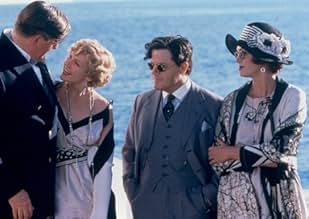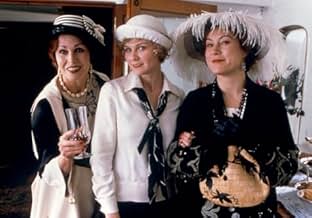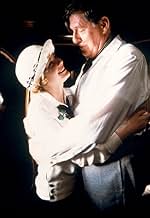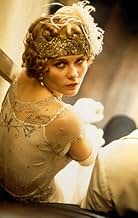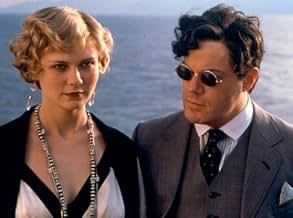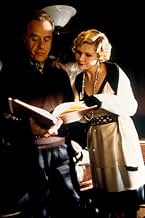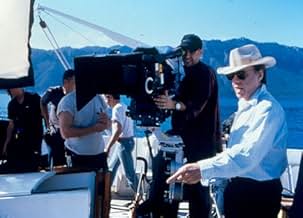VALUTAZIONE IMDb
6,4/10
9358
LA TUA VALUTAZIONE
Aggiungi una trama nella tua linguaSemi-true story of the Hollywood murder that occurred at a star-studded gathering aboard William Randolph Hearst's yacht in 1924.Semi-true story of the Hollywood murder that occurred at a star-studded gathering aboard William Randolph Hearst's yacht in 1924.Semi-true story of the Hollywood murder that occurred at a star-studded gathering aboard William Randolph Hearst's yacht in 1924.
- Premi
- 1 vittoria e 1 candidatura in totale
Zoe Mavroudi
- Servant
- (as Zoi Mavroudi)
Despina Mirou
- Servant
- (as Despina Morou)
Recensioni in evidenza
The Cat's Meow is a semi-true story of a murder that occurred on William Randolph Hearst's yacht one evening in 1924. While much of the screenplay is presumably speculation, it is interesting to see the effects the murder on some of his other guests, like Marion Davies, Hearst's mistress, Charlie Chaplin and Luella Parsons, among others.
This film couldn't fail for me its subject matter involves William Randolph Hearst, a foe of my main obsession Orson Welles, and it contained one of my favorite entertainers in the cast, Eddie Izzard as Charlie Chaplin. However, while watching the film I had to consider whether the movie was a well-written drama or simply too slow in its development, making the climax more of a let-down than anything. If the film wasn't book-ended by compelling writing that made you both look deeply into the subject matter from the beginning, then reflect on the past events at the conclusion, I would have said the latter was true. And while Eddie Izzard was fantastic as Chaplin, and Kirsten Dunst wasn't her usual irritating self as Davies, it was Joanna Lumley who I thought was the breakout star of the film. Her role was small, but integral to the progression of the film acting as narrator, analyst and the film's conscience.
While not a fast paced, action filled film, The Cat's Meow is pleasant to experience based on its dramatic merits. Bogdanovich is more of an actor as of late than a director, but this film's character-driven dramatic elements harkens back to his best known classic, The Last Picture Show. If you are a fan of film history as I am, you will find this film interesting and thought-provoking.
--Shelly
This film couldn't fail for me its subject matter involves William Randolph Hearst, a foe of my main obsession Orson Welles, and it contained one of my favorite entertainers in the cast, Eddie Izzard as Charlie Chaplin. However, while watching the film I had to consider whether the movie was a well-written drama or simply too slow in its development, making the climax more of a let-down than anything. If the film wasn't book-ended by compelling writing that made you both look deeply into the subject matter from the beginning, then reflect on the past events at the conclusion, I would have said the latter was true. And while Eddie Izzard was fantastic as Chaplin, and Kirsten Dunst wasn't her usual irritating self as Davies, it was Joanna Lumley who I thought was the breakout star of the film. Her role was small, but integral to the progression of the film acting as narrator, analyst and the film's conscience.
While not a fast paced, action filled film, The Cat's Meow is pleasant to experience based on its dramatic merits. Bogdanovich is more of an actor as of late than a director, but this film's character-driven dramatic elements harkens back to his best known classic, The Last Picture Show. If you are a fan of film history as I am, you will find this film interesting and thought-provoking.
--Shelly
I have to say, I thought the Cat's Meow was the cat's pajamas. Peter Bogdanovich has made a story out of an event whose outcome is still unexplained. What's more, it feels like it actually could've happened. The interactions between the characters leading up to the act are given much more screen time than the actual act itself. So when it happens, it doesn't seem preposterous at all.
The story concerns newspaper honcho William Randolph Hearst (Edward Herrmann) and company celebrating the birthday of Hollywood producer Thomas Ince (Cary Elwes) on Hearst's yacht. That company includes Hearst's lover/actress Marion Davies (Kirsten Dunst), Charlie Chaplin (Eddie Izzard), author Elinor Glyn (Joanna Lumley), gossip columnist for Hearst's newspaper Louella Parsons (Jennifer Tilley), and Tom's lover. Tom hopes to negotiate a contract with W.R. Hearst for Marion to star in his next few films, but Hearst is more concerned about the attraction between Marion and Chaplin. Elinor is nearby to dispense advice, while Louella unsuccessfully attempts to mingle. There's also a pair of party girls on board attempting to have a raucous time as possible.
The Cat's Meow has an eclectic ensemble with a Robert Altman-esquire taste to it. Edward Herrmann's role may be the most challenging, because he has to juggle eccentric, warmth, and jealousy as W.R. Hearst. Joanna Lumley is wonderfully dry. And for those like me who only remember Eddie Izzard for his droll stand-up work, he's surprising in this film. He's quite good as Charlie Chaplin. Kirsten Dunst is the biggest name on the cast. She's very fetching in the Cat's Meow, and this represents a change of pace from her dearth of Hollywood-oriented films.
As good as the cast is, this is really just as much Peter Bogdanovich's film. After the excellent Last Picture Show, he sort of faded away and made smaller films (The Thing Called Love, for example). Although The Cat's Meow will not make him a household name, hopefully maybe his work will garner more attention again. His direction is very good here.
Oh, I should also mention the costume design and music here. The production values in general are excellent in imitating the feel of that era. I was reminded a little of Woody Allen's Bullets Over Broadway (and not just the Jennifer Tilly connection). Anyways, The Cat's Meow is a good movie with interesting characters and thoughtful direction.
The story concerns newspaper honcho William Randolph Hearst (Edward Herrmann) and company celebrating the birthday of Hollywood producer Thomas Ince (Cary Elwes) on Hearst's yacht. That company includes Hearst's lover/actress Marion Davies (Kirsten Dunst), Charlie Chaplin (Eddie Izzard), author Elinor Glyn (Joanna Lumley), gossip columnist for Hearst's newspaper Louella Parsons (Jennifer Tilley), and Tom's lover. Tom hopes to negotiate a contract with W.R. Hearst for Marion to star in his next few films, but Hearst is more concerned about the attraction between Marion and Chaplin. Elinor is nearby to dispense advice, while Louella unsuccessfully attempts to mingle. There's also a pair of party girls on board attempting to have a raucous time as possible.
The Cat's Meow has an eclectic ensemble with a Robert Altman-esquire taste to it. Edward Herrmann's role may be the most challenging, because he has to juggle eccentric, warmth, and jealousy as W.R. Hearst. Joanna Lumley is wonderfully dry. And for those like me who only remember Eddie Izzard for his droll stand-up work, he's surprising in this film. He's quite good as Charlie Chaplin. Kirsten Dunst is the biggest name on the cast. She's very fetching in the Cat's Meow, and this represents a change of pace from her dearth of Hollywood-oriented films.
As good as the cast is, this is really just as much Peter Bogdanovich's film. After the excellent Last Picture Show, he sort of faded away and made smaller films (The Thing Called Love, for example). Although The Cat's Meow will not make him a household name, hopefully maybe his work will garner more attention again. His direction is very good here.
Oh, I should also mention the costume design and music here. The production values in general are excellent in imitating the feel of that era. I was reminded a little of Woody Allen's Bullets Over Broadway (and not just the Jennifer Tilly connection). Anyways, The Cat's Meow is a good movie with interesting characters and thoughtful direction.
`The Cat's Meow' is a mildly enjoyable telling of a notorious tall story that has been told in Hollywood for nearly eighty years.
Super-magnate William Randolph Hearst (Edward Herrmann) invites a diverse mix of Hollywood biggest names and its oddest fringe dwellers to celebrate the birthday of famed director Thomas Ince (Cary Elwes) aboard his luxury yacht. Things begin to fall apart when Hearst suspects a guest - none other than Charlie Chaplin (Eddie Izzard), the most famous man in the world - of having an affair with his actress girlfriend, Marion Davies (Kirsten Dunst).
Although the film is entertaining, there is something underwhelming about it. Its stage origins are obvious - characters perambulate from plot point to plot point, spouting exposition, never appearing much more than caricatures, and thus failing to evoke much sympathy.
The casting of Eddie Izzard in the pivotal role of Charles Chaplin is a grave mistake, though the script saddles him with a most unsatisfactory characterisation of Chaplin to work with. Chaplin was not a serial romancer, as is implied in the film, but a serial seducer. He would have been the last person to urge a woman to run away with him on the basis of undying love. He spent his most famous years running from women who suggested exactly that, freely admitting to them that while sex was a pleasant diversion, his work came before any woman. It's a casting decision that is an obvious attempt to distance us from the Little Tramp as opposed to Chaplin the real man, but we never get a true sense of either. Ironically, Izzard actually resembles the real Thomas Ince far more than does Cary Elwes, and as a real-life cabaret performer could conceivably have brought the flamboyance and eccentricity of the real-life director to life better than Elwes does.
The film also takes an annoyingly facile view of women, perpetuating the dull cliche that all women spent the 1920s with a bad case of St Vitus' dance and addicted to laughing gas. The grating performances of Claudie Blakley and Chiara Schoras in particular throw the beautifully understated efforts of Kirsten Dunst into high relief. Dunst feels like the only real person in this cast of cartoon characters - beautiful, funny, and vital, she is the best thing in the film. Yet there is never any moment in the movie to suggest the true depth of her dedication and passion for Hearst (portrayed as a roly-poly father figure rather than the hard nosed businessman he was), nor any justification for leaving him for the roguish but uncharismatic Chaplin. Unfortunately, the more interesting conflicts in Marion's life, such as her growing alcoholism and her dissatisfaction with Hearst's insistence on casting her in leaden romances rather than the comedy to which she was so obviously suited, are only touched on lightly.
Though it could have been a thought-provoking and complex experience, as Joanna Lumley's poignant final statements imply (and like `Gosford Park' to which it has been compared), in the end `The Cat's Meow' doesn't feel much more substantial than your average game of Cluedo.
Super-magnate William Randolph Hearst (Edward Herrmann) invites a diverse mix of Hollywood biggest names and its oddest fringe dwellers to celebrate the birthday of famed director Thomas Ince (Cary Elwes) aboard his luxury yacht. Things begin to fall apart when Hearst suspects a guest - none other than Charlie Chaplin (Eddie Izzard), the most famous man in the world - of having an affair with his actress girlfriend, Marion Davies (Kirsten Dunst).
Although the film is entertaining, there is something underwhelming about it. Its stage origins are obvious - characters perambulate from plot point to plot point, spouting exposition, never appearing much more than caricatures, and thus failing to evoke much sympathy.
The casting of Eddie Izzard in the pivotal role of Charles Chaplin is a grave mistake, though the script saddles him with a most unsatisfactory characterisation of Chaplin to work with. Chaplin was not a serial romancer, as is implied in the film, but a serial seducer. He would have been the last person to urge a woman to run away with him on the basis of undying love. He spent his most famous years running from women who suggested exactly that, freely admitting to them that while sex was a pleasant diversion, his work came before any woman. It's a casting decision that is an obvious attempt to distance us from the Little Tramp as opposed to Chaplin the real man, but we never get a true sense of either. Ironically, Izzard actually resembles the real Thomas Ince far more than does Cary Elwes, and as a real-life cabaret performer could conceivably have brought the flamboyance and eccentricity of the real-life director to life better than Elwes does.
The film also takes an annoyingly facile view of women, perpetuating the dull cliche that all women spent the 1920s with a bad case of St Vitus' dance and addicted to laughing gas. The grating performances of Claudie Blakley and Chiara Schoras in particular throw the beautifully understated efforts of Kirsten Dunst into high relief. Dunst feels like the only real person in this cast of cartoon characters - beautiful, funny, and vital, she is the best thing in the film. Yet there is never any moment in the movie to suggest the true depth of her dedication and passion for Hearst (portrayed as a roly-poly father figure rather than the hard nosed businessman he was), nor any justification for leaving him for the roguish but uncharismatic Chaplin. Unfortunately, the more interesting conflicts in Marion's life, such as her growing alcoholism and her dissatisfaction with Hearst's insistence on casting her in leaden romances rather than the comedy to which she was so obviously suited, are only touched on lightly.
Though it could have been a thought-provoking and complex experience, as Joanna Lumley's poignant final statements imply (and like `Gosford Park' to which it has been compared), in the end `The Cat's Meow' doesn't feel much more substantial than your average game of Cluedo.
No one will ever know what really happened aboard William Randolph Hearst's yacht on that fateful weekend in 1924. Director Peter Bogdanovich recreates it based on rumors in "The Cat's Meow," a 2001 film starring Kirsten Dunst, Edward Herrmann, Cary Elwes, Eddie Izzard, Joanna Lumley and Jennifer Tilly. The weekend in question is a celebration of producer Thomas Ince's birthday aboard Hearst's yacht with a guest roster that included Hearst, Marion Davies, Ince, his mistress, Margaret Livingston, Louella Parsons, writer Elinor Glyn, Charlie Chaplin and others. Thomas Ince was removed from the yacht, supposedly ill, and died in his home several days later, supposedly of heart failure. Rumor has it that Hearst, suspecting an affair between Davies and Charlie Chaplin, shot Ince by accident, either mistaking him for Chaplin or because Ince happened to be on the dock at the same time and got in the line of fire. Morning newspapers (not Hearst papers) claimed that Ince had been shot; the evening papers did not carry that story, nor did the Hearst papers. No one who was on board the yacht ever spoke of the incident except in the most ambiguous of ways. Louella Parsons' column became syndicated in over 600 papers, and she worked for Hearst until she retired; Ince's mistress Livingston received a whopping increase in salary. She finally retired to manage her husband Paul Whiteman's band.
That's the story Bogdanovich goes with, and it makes for a meandering but intriguing story. The "meandering" part is not so much a fault of the film but done on purpose - it's a weekend yacht party, after all, and Bogdanovich shows us the parties, the conversations and the intrigues of various guests. He captures the atmosphere of the '20s and the splendor of Hearst's yacht very well.
It's hard to say how accurate the actors were with their characterizations; for my part, I don't know what Charlie Chaplin, Hearst, Glyn or Parsons were really like. From seeing Marion Davies in films and in photographs, Dunst seems too young, though her acting is good. Herrmann I suspect captures Hearst beautifully - powerful, a good host, a sometimes brutal man and very much in love with Marion. (When he saw Citizen Kane, believing that Susan Alexander was based on Marion, he was most upset at the portrayal of Susan as a drunk.) Tilly plays Parsons as if she was an airhead - I believe externally in real life, Parsons did come off as a silly, ineffectual woman, all the better to gain your confidence; in fact, she was an ambitious person who wielded a lot of power. Tilly captures this; in her last scene, Parsons gets down to business and drops a lot of her act. Lumley's Elinor Glyn is elegant, intelligent and more of an observer (she narrates the film) - I suspect that is true as well. Cary Elwes doesn't register much as Ince, who is portrayed as a desperate man trying to get his career back on track with Hearst's help.
Eddie Izzard's Chaplin is problematic. Physically he seems all wrong - Chaplin was quite good-looking and much slighter than Izzard; Izzard hints at a British accent but doesn't really come off as very British or very graceful, which Chaplin definitely was. The writing of this character may be incorrect as well, as it's doubtful that Chaplin would have actually wanted Marion to leave Hearst.
All in all, though it's not an edge of your seat kind of film, "The Cat's Meow" is a good film about a fascinating piece of Hollwyood lore. It seems likely that Ince did not die of indigestion, heart failure, or suicide, but that something did happen and the guests were sworn to silence; it's also more than likely that the police and DA cooperated in covering it up. There is an interesting sidebar to this story - Davies' secretary Abigail Kinsolving, was considered a suspect in Ince's death (strange, since he supposedly died of heart failure). She claimed to have been raped by Ince, and it was noted by guests on the yacht that she had bruises on her body. She had a baby some months later and died in a car accident near San Simeon. Two suspicious things there: she was found by Hearst bodyguards, and there was a suicide note that wasn't in her handwriting. Her orphaned daughter was supported by Marion Davies. Did Kinsolving know too much? Whether she did or not, the rest of us know too little.
That's the story Bogdanovich goes with, and it makes for a meandering but intriguing story. The "meandering" part is not so much a fault of the film but done on purpose - it's a weekend yacht party, after all, and Bogdanovich shows us the parties, the conversations and the intrigues of various guests. He captures the atmosphere of the '20s and the splendor of Hearst's yacht very well.
It's hard to say how accurate the actors were with their characterizations; for my part, I don't know what Charlie Chaplin, Hearst, Glyn or Parsons were really like. From seeing Marion Davies in films and in photographs, Dunst seems too young, though her acting is good. Herrmann I suspect captures Hearst beautifully - powerful, a good host, a sometimes brutal man and very much in love with Marion. (When he saw Citizen Kane, believing that Susan Alexander was based on Marion, he was most upset at the portrayal of Susan as a drunk.) Tilly plays Parsons as if she was an airhead - I believe externally in real life, Parsons did come off as a silly, ineffectual woman, all the better to gain your confidence; in fact, she was an ambitious person who wielded a lot of power. Tilly captures this; in her last scene, Parsons gets down to business and drops a lot of her act. Lumley's Elinor Glyn is elegant, intelligent and more of an observer (she narrates the film) - I suspect that is true as well. Cary Elwes doesn't register much as Ince, who is portrayed as a desperate man trying to get his career back on track with Hearst's help.
Eddie Izzard's Chaplin is problematic. Physically he seems all wrong - Chaplin was quite good-looking and much slighter than Izzard; Izzard hints at a British accent but doesn't really come off as very British or very graceful, which Chaplin definitely was. The writing of this character may be incorrect as well, as it's doubtful that Chaplin would have actually wanted Marion to leave Hearst.
All in all, though it's not an edge of your seat kind of film, "The Cat's Meow" is a good film about a fascinating piece of Hollwyood lore. It seems likely that Ince did not die of indigestion, heart failure, or suicide, but that something did happen and the guests were sworn to silence; it's also more than likely that the police and DA cooperated in covering it up. There is an interesting sidebar to this story - Davies' secretary Abigail Kinsolving, was considered a suspect in Ince's death (strange, since he supposedly died of heart failure). She claimed to have been raped by Ince, and it was noted by guests on the yacht that she had bruises on her body. She had a baby some months later and died in a car accident near San Simeon. Two suspicious things there: she was found by Hearst bodyguards, and there was a suicide note that wasn't in her handwriting. Her orphaned daughter was supported by Marion Davies. Did Kinsolving know too much? Whether she did or not, the rest of us know too little.
It begins with a funeral, for whom you don't know except who ever it is, he or she is getting quite a send-off to the tune of Aloha Nui played by a pair of musicians strumming ukuleles. Now if you have a photographic memory and can remember the faces of the hundreds of mourners, then perhaps it won't be a mystery as to who will be in the casket. You do know however, that someone invited to a lavish any thing goes party aboard William Randolph's Hearst's yacht the Oneida in the flash back that follows the funeral will. The movie seems to go nowhere for a while,mostly just watching fun and games of those lucky enough to be invited, even though you know the price one aboard that yacht is destined to pay for this trip. You almost forget the funeral and the mystery of what this movie is about who is in that casket, but it is well worth the wait. Like any good mystery, the unlucky victim is one you'd least expect, though you'd think it would have been Charlie Chaplin , but we know he lived to a ripe old age. Until it gets to that point, you get to see another take on what William Randolph, child-like but likable and with some pretty quirky flaws, making one wonder how he ever became so rich. As most people have seen Citizen Kane, we already know about infatuation with Marion Davies bordering on an obsession, but probably don't know that a competition for her existed between Charlie Chaplin and Hearst and how this competition creates the mystery as to whoever is in the box got there.
The epilogue of this film was probably the most interesting of any film I ever seen. Secrets had to be kept and Hearst was willing to pay any price to see they were kept, granting all who cooperated, and apparently all did, whatever wish (and he could do it) as any genie in any bottle. If you are looking for something different and willing to give this movie a chance, this movie is for you. This movie deserves better than the 6.5 of the IMDb and I give this movie a 7.5/10.
The epilogue of this film was probably the most interesting of any film I ever seen. Secrets had to be kept and Hearst was willing to pay any price to see they were kept, granting all who cooperated, and apparently all did, whatever wish (and he could do it) as any genie in any bottle. If you are looking for something different and willing to give this movie a chance, this movie is for you. This movie deserves better than the 6.5 of the IMDb and I give this movie a 7.5/10.
Lo sapevi?
- QuizThe costuming and sets were designed with as little color as possible to give the illusion of a black and white film. This was to make up for the fact that the film wasn't allowed to be filmed in black and white as originally planned.
- BlooperSamsonite/Schwayer Streamlite luggage in Admiral blue is visible in Marion Davis's suite. Samsonite did not begin manufacturing Streamlite until the late-'30s/early-'40s.
- Citazioni
Marion Davies: Nothing can happen this weekend.
Charlie Chaplin: So what are you doing next weekend?
- Curiosità sui creditiThe characters, entities, and events depicted and the names used in this motion picture are fictitious. Any similarities to any actual persons living or dead or to any actual entities or events is entirely coincidental and unintentional.
- ConnessioniFeatured in Anatomy of a Scene: The Cat's Meow
- Colonne sonoreAfter You've Gone
Performed by Kirsten Dunst with Ian Whitcomb & His Bungalow Boys
Written by Henry Creamer and Turner Layton
I più visti
Accedi per valutare e creare un elenco di titoli salvati per ottenere consigli personalizzati
- How long is The Cat's Meow?Powered by Alexa
Dettagli
Botteghino
- Budget
- 7.000.000 USD (previsto)
- Lordo Stati Uniti e Canada
- 3.209.481 USD
- Fine settimana di apertura Stati Uniti e Canada
- 111.037 USD
- 14 apr 2002
- Lordo in tutto il mondo
- 3.646.994 USD
- Tempo di esecuzione
- 1h 54min(114 min)
- Colore
- Mix di suoni
- Proporzioni
- 1.85 : 1
Contribuisci a questa pagina
Suggerisci una modifica o aggiungi i contenuti mancanti


